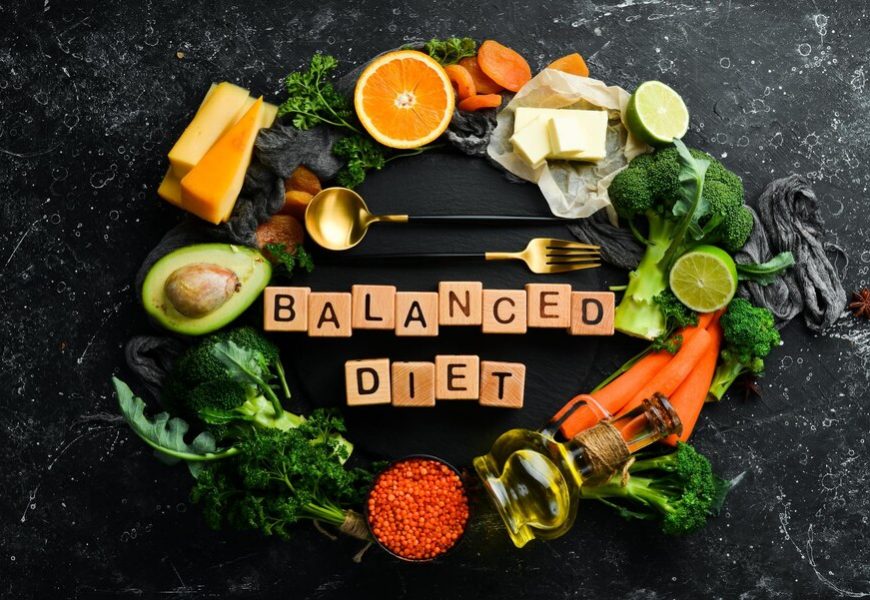It is crucial to understand the importance of nutrition in health to preserve general well-being. In addition to maintaining normal physical processes, nutrition also promotes growth and development and lowers the risk of chronic illnesses. For optimum health and vigor, a diet rich in essential nutrients and well-balanced is necessary. The importance of a balanced diet lies in its ability to provide the essential nutrients your body needs to function effectively. A well-balanced diet supports overall health, boosts energy levels, and helps prevent diseases. By incorporating a variety of nutrient-rich foods into your meals, you ensure that your body gets the right balance of vitamins, minerals, proteins, and carbohydrates it needs to thrive.
In this blog, we will explore the nutrition essentials, the significance of a balanced diet, its benefits, and common mistakes to avoid while planning your meals. This comprehensive guide will help you take the first step toward a healthier lifestyle.
What is Nutrition?
The importance of nutrition in health has a significant impact on human energy. In addition to providing energy for the body, a nutritious and well-balanced diet strengthens the immune system, improves mental clarity, and promotes safer pregnancies. Furthermore, it is essential in lowering the chance of developing long-term conditions including diabetes and heart problems. To put it simply, our productivity and health are directly impacted by the food we eat. Choosing a nutrient-dense diet lowers the risk of acquiring crippling chronic illnesses, promotes a healthy pregnancy, and helps one maintain a suitable body weight. “You are what you eat,” as the saying goes, highlights the close relationship between general health vigor and nutrition.
What is a Balanced Diet?
Balanced diet meaning: A balanced diet means a meal plan that involves all the needed nutrients—carbohydrates, proteins, fats, vitamins, minerals, and water—in the right proportions to meet your body’s daily needs. It emphasizes variety and moderation, making sure that your body is fueled enough to function optimally while supporting repair, growth, and overall well-being.
A good diet provides your body with the nutrients it requires to function properly. To get the nutrition you require, majorly the daily calories should come from:
- Fresh fruits
- Fresh vegetables
- Whole grains
- Legumes
- Nuts
- Lean proteins
Why Nutrition is Important?
Processed, sugary, fatty, and salty meals, as we’ve observed, deplete the body and impair its ability to perform. However, eating fresh, whole-food meals provides the body with the energy it needs to power itself, promote overall health, address micronutrient deficiencies, avoid chronic diseases, and burn fat. Water, fiber, vitamins, minerals, proteins, carbohydrates, and fats are the seven primary nutritional kinds that a healthy human body needs to survive. Although humans may survive with fewer micronutrients (vitamins and minerals), we require a lot of macronutrients.
These are the types of nutrition required:
- Proteins
- Carbohydrates
- Fats
- Vitamins
- Minerals
Factors Influencing Nutrition Needs
It is critical to comprehend the importance of nutrition in health to preserve general well-being and fend against chronic illnesses. A diet full of key nutrients—vitamins, minerals, proteins, and carbohydrates—supports the body’s normal functioning and encourages both physical and mental energy.
Individual dietary requirements can differ according to lifestyle choices, age, and gender. People may improve their quality of life and longevity while lowering their chance of contracting illnesses like diabetes and cardiovascular disorders by making healthy eating a priority. Dietary strategies that are customized to meet individual needs emphasize even more how important it is to include a balanced diet in everyday living.
These are the factors influencing nutrition needs:
- Age: Age has a major impact on the nutrients you need to have. For example, a child’s requirement for vitamin C rises with time. Similar to phosphorus, calcium needs to increase during youth but decrease with age. The gastrointestinal system often absorbs less magnesium and vitamin B12 in elderly persons. Older folks also produce less vitamin D via their skin. In older people, lutein, a pigment found in spinach, may help prevent age-related macular degeneration.
- Gender: Gender has a major impact on the amount of nutrients required as well. Women need more iron and calcium than males do. Women are also often recommended to take vitamin D and calcium combined since vitamin D helps the body absorb calcium. Iron, calcium, vitamin D, folate, and other B vitamins are essential for the development of the developing embryo throughout pregnancy. Pregnancy also increases the requirement for a number of minerals, including calcium, iron, and zinc.
- Lifestyle: Your dietary requirements have been modified by your lifestyle. Diet is the most important lifestyle factor that impacts health. Poor nutrition and its consequences, such as obesity, are common health problems in urban areas. One may utilize BMI to identify harmful lifestyle choices. Urban living contributes to nutritional problems including consuming unhealthy and fast food, which raises the risk of lifestyle diseases like diabetes, high cholesterol, and others.
- Physical Activity: Your degree of physical activity has an impact on the nutrients you require. A family of nutrients known as electrolytes is vital for maintaining the fluid equilibrium in the body. Salt is essential for health, as are the electrolytes magnesium, calcium, potassium, and chloride, even if eating too much of it is unhealthy. Make sure the salt in your diet is sufficient to replenish the salt you have lost. Even while a lot of energy drinks include electrolytes, their high sugar level makes them unsuitable for weight loss efforts.
- Cultural Context: Cultural influences include eating habits, food preparation techniques, and in certain cases, the ability to enforce dietary restrictions such as excluding meat and dairy products. Cultural influences may shift, though, and people often adopt certain local eating habits when they relocate to a new nation.
- Locally Available Foods: Large cities have supermarkets with a huge selection of goods. But, if you reside in a smaller town or city, the food options in your area could have a big impact on what you eat. Furthermore, Indians may get their carbohydrates from indigenous foods like rice and chapati rather than oats or bread. This is so because these meals are more suited to Indian physiologies and are mainstays in the area.
- Dietary and Food Customs: Food is a common tool used by people to maintain their cultural identities. People from various ethnic backgrounds prepare distinct foods. For example, this explains why pasta makes you think of Italy while idli makes you think of South India.
Benefits of Good Nutrition
These are the dietary advantages of healthy eating that go much beyond physical well-being. A balanced diet improves cognitive performance and emotional well-being in addition to boosting healthy weight management, boosting immunity, and lowering the risk of chronic illnesses.
A healthy diet promotes children’s optimal growth and development, improved sleep habits, and increased vitality. People who nourish their bodies with vital nutrients might feel happier, concentrate better, and be more productive all day long. Including nutrient-dense foods in regular meals improves overall quality of life in addition to supporting long-term health. These are some benefits of good nutrition:
- Maintains Good Heart Health: Maintaining good heart health is crucial, especially in a country like India, where hypertension is prevalent, leading to heart attacks and strokes. Lifestyle changes, such as regular physical activity and a balanced diet rich in fruits, vegetables, whole grains, and low-fat dairy, can significantly reduce the risk of heart disease by managing blood pressure and cholesterol levels.
- Improves Wellbeing: A balanced diet comprising various food groups is essential for overall health and well-being. It provides the necessary energy for daily activities, enhances concentration, and improves sleep quality. For example, the Mediterranean diet, abundant in fish, healthy fats, and vegetables, is associated with improved mental well-being and reduced depression.
- Maintains Immune System: Proper nutrition supports a robust immune system, guarding against infections and immunodeficiency disorders by providing essential vitamins and minerals.
- Increases Energy Levels: Transitioning to a healthy diet result in increased energy levels, stability in blood sugar levels, and sustained energy throughout the day. Whole grains, fruits, and vegetables are healthier sources of carbs compared to refined options like white bread and sweets.
- Delays the Effects of Aging: Certain vitamins and minerals found in foods like tomatoes, berries, avocados, almonds, and seafood contribute to healthy skin, delaying the signs of aging. For instance, vitamin C in tomatoes promotes collagen synthesis, while
Explain the Importance of Balanced Diet
A balanced diet is the cornerstone of a a healthy life, providing the body with the essential nutrients it needs to function optimally. It ensures a harmonious balance of carbohydrates, proteins, fats, vitamins, and minerals, supporting both physical and mental well-being. Without proper nutrition, the body becomes vulnerable to fatigue, illnesses, and long-term health complications. Let’s explore how a balanced diet impacts various aspects of health:
- Better Physical Health: Improves the body’s ability to fight diseases and provides strength to the immune system.
- Enhanced Energy Levels: Generates the fuel to the body, enhances productivity, and keeps fatigue at bay.
- Good Digestion: Assists in maintaining a healthy digestive system, preventing problems like constipation and bloating.
- Healthier Bones and Teeth: Supplies important nutrients like calcium and vitamin D to maintain bone density and dental health.
- Good Skin Health: Promotes clear and glowing skin with nutrients like healthy fats and antioxidants.
- Stable Mental Health: Assists and supports brain function, lowers stress, and improves mood, contributing to overall mental stability.
By maintaining a balanced diet in daily routines, individuals can achieve a healthier and more fulfilling life.
Common Mistakes to Avoid
Having a balanced diet needs proper effort, but even with good intentions, certain habits can take you off the nutritional goals. Many people unconsciously fall into patterns that hinder their health and well-being. Avoiding these common mistakes is crucial for experiencing the full benefits of a balanced diet:
- Irregular Meals: Skipping meals or eating at irregular times disturbs the body’s metabolism, leading to energy inconsistencies and potential weight gain.
- Low Consumption of Fruits and Vegetables: Losing out on these nutrient-rich foods lowers fiber, antioxidants, and vitamin intake which are essential for good digestion and immune health.
- Relying Heavily on Convenience Foods: These are usually full of sugars, unhealthy fats, and preservatives, which can increase the risk of chronic diseases like heart problems and diabetes.
- Consuming Excessive Salt: Adding too much salt in meals can lead to strain in the heart and high blood pressure, making it necessary to monitor sodium intake.
- Drinking Less Water: Dehydration can cause a weakened immune system, fatigue, and digestive issues, focusing on the need for 6–8 glasses daily.
By taking care of these mistakes, individuals can take crucial steps toward a healthier and more balanced lifestyle.
What to Eat for a Balanced Diet?
A well-balanced diet provides your body with the crucial nutrients it requires for proper functioning. It includes various food groups to be consumed in proportion to balance energy levels, protect against disease, and support growth. Here’s a breakdown of the key nutrients you should include in your diet and their sources:
- Vitamins, Minerals, and Antioxidants: These micronutrients are important for health, supporting everything from skin health to immune function. Considering a variety of vegetables, colorful fruits, seeds, and nuts, in your food to make sure that there is a proper intake of these essential elements.
- Carbohydrates, Including Starches and Fiber: The body’s main energy source is carbohydrates. Whole grains, fruits, vegetables, and legumes, provide your body with complex carbs and dietary fiber, which support digestion and balance energy levels throughout the day.
- Protein: Essential for muscle repair and growth, proteins also play a crucial role in hormone regulation and enzyme production. Include lean meats, fish, eggs, dairy products, legumes, nuts, and seeds to meet your daily protein requirements.
- Healthy Fats: Fats are important for brain health, energy, and hormone production. Go for unsaturated fats found in olive oil, nuts, avocados, seeds, and fatty fish like salmon, while lowering on saturated and trans fats.
By fusing these nutrients in balanced proportions, you can make meals that are both satisfying and nourishing, ensuring long-term health benefits.
Food to Include
Adding different food groups into your day-to-day meals is important for maintaining a balanced diet and making sure that your body gets the required nutrients to function optimally. Below are the key food categories to include:
- Fruits: Rich in essential vitamins, minerals, and natural sugars, fruits are a great way to boost your energy levels and boost your immunity with antioxidants. For a complete nutritional profile, try to incorporate a range of fruits, including bananas, berries, oranges, and apples.
- Vegetables: Vegetables are essential for digestive health and general well-being since they are high in fiber, vitamins, and minerals. Incorporate cruciferous veggies like broccoli and cauliflower, leafy greens like spinach and kale, and colorful vegetables like bell peppers and carrots into your meals.
- Grains: Complex carbs, fiber, and B vitamins are abundant in whole grains, such as brown rice, quinoa, oats, and whole wheat bread. These grains promote digestive and heart health while providing long-lasting energy.
- Dairy: Calcium, vitamin D, and protein—all necessary for healthy bones and teeth—are found in dairy products like milk, yogurt, and cheese. For a better balance, choose fortified or low-fat choices.
- Protein Foods: Proteins are essential for the formation, growth, and repair of muscles. To satisfy your body’s needs, include a variety of foods high in protein, such as lean meats, fish, eggs, beans, lentils, tofu, and nuts.
Including these food groups in your diet ensures a comprehensive nutrient intake, promoting energy, vitality, and overall well-being.
What Education Do Dietitians Need?
A bachelor’s degree in dietetics, nutrition, or a similar discipline from an authorized university is normally required of dietitians. However, further degrees like a master’s or doctorate may be required for specialized tasks or research employment. Accreditation Council for Education in Nutrition and Dietetics (ACEND)-accredited internships and supervised practice programs are common ways to get the essential practical experience. The extensive training offered by AAFT Online’s Diploma in Nutrition and Dietetics covers subjects including therapeutic nutrition treatments, meal planning, and dietary needs. This program combines academic knowledge with real-world experience to equip students for rewarding careers as dietitians.
Conclusion
We hope we have answered your question, what does good nutrition mean, and what is good nutrition food? Good nutrition means making informed dietary choices to support bodily functions, promote growth and development, and reduce the risk of chronic illnesses. Recognizing the importance of nutrition in health is essential for overall well-being. Opting for nutrient-dense foods like fruits, vegetables, whole grains, and lean proteins is crucial for maintaining good health and vitality.
A balanced diet is essential for maintaining optimal health and well-being. By incorporating a variety of nutrient-rich foods such as fruits, vegetables, grains, dairy, and protein sources, you ensure that your body receives the essential nutrients it needs to function effectively. The importance of a balanced diet lies in its ability to support physical health, enhance energy levels, promote mental stability, and prevent diseases.
As you take steps toward a healthier lifestyle, remember what the importance of balanced diet for body is, the importance of balanced diet, and what is the importance of balanced diet in building a strong foundation for overall health. Take charge today and embrace the transformative benefits of a balanced diet.



















